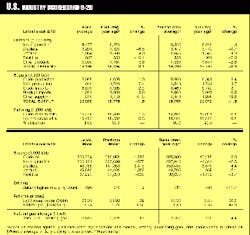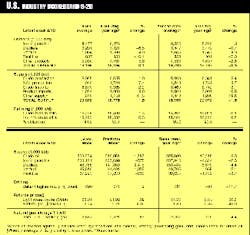OGJ Newsletter
null
As OPEC oil ministers prepare to meet in Vienna this week, all signs are indicating that the group will stick to its plan to curb oil production through March 2000.
Three key OPEC ministers met in Jeddah last week. After conferring with Iranian Minister of Petroleum Bijan Zangeneh and Algerian Minister of Energy and Mines Youcef Yousfi, Saudi Arabian Minister of Petroleum and Mineral Resources A* I. Naimi said, "There is joint satisfaction with the improvement in oil prices over the past months, which must be maintained."
Yousfi arrived in Jeddah from Kuwait, where he had met with Oil Minister Sheikh Saud Nasser al-Sabah, who was quoted in the local press as saying, "I want to make it clear that we are committed to the March agreement, and there is no room for a reconsideration of OPEC's policy set in March...In March next year, we will consider two issues: first, the volume of the global oil stockpile; and second, the oil price average over 1 year, from March 1999 to March 2000."
Not everyone will be pleased with the plan. London's CGES, for one, sees it as likely to cause a price spike that will prompt non-OPEC producers to raise output (see story, p. 23, and Editorial, p. 19).
OPEC is continuing to maintain a high level of compliance with the cutback agreement they reached last March-also signed by four leading non-OPEC producers-to reduce output by over 2 million b/d. According to IEA's latest figures, August OPEC compliance stood at about 92%, compared with a revised level of 89% for July. "Global oil production fell to 73.15 million b/d, led by OPEC supply cuts in August," said IEA in its latest market report.
Non-OPEC output declined by 60,000 b/d to 44.28 million b/d, due largely to maintenance in Norway, says IEA, while OPEC crude supply fell by 140,000 b/d to 26.04 million b/d. Oil demand, which was relatively stable in the second quarter, looks set to increase significantly towards the end of the year. Second quarter demand was about 73.1 million b/d, up only marginally from second quarter 1998's 72.9 million b/d. In the third quarter, the increase is expected to be around 1.1 million b/d, or 1.4%, as a result of stronger demand in Asia and North America. Demand should then rise to 77 million b/d in the fourth quarter-an increase of 2.4%, or 1.8 million b/d, over the same period in 1998.
The two areas of the world expected to log net increases in productive capacity in the next 5-10 years are the Middle East and the Caspian Sea region, said Reginal Spiller, senior vice-president of Frontera Resources, at a joint CGES-OGJ conference in Houston (see stories, pp. 25, 28).
"(The Middle East's) natural gas resources may power the next millennium," said Michael Stinson, senior vice-president of government affairs for Conoco. "As (its) economies evolve and matureellipse(the region) will migrate more to the role of trading partner rather than raw material supplier." But in the political battle of wills between the U.S. and Iran, there will be another loser: the Caspian region.
"U.S. policy will make or break the Caspian," said Rob Sobhani, president of Caspian Energy Consulting. Right now, the U.S.'s tenets, with regard to the region, are: exclusion of Iran; uninterrupted transport of Caspian oil to international markets; multiple pipeline options; development of "civil" societies based on democracy and personal rights; and peaceful resolution of the region's ethnic conflicts. But there are some fundamental obstacles to achieving these goals, he says. One is the type of governments that the key producing countries will develop. A second is the Armenian-Azeri ethnic conflict, which Sobhani calls "a serious problem": "If this problem is not solved, we can kiss the pipelines goodbye." A third key obstacle is the nature of the regime in Iran, which will determine whether any Caspian export pipelines will traverse the country.
Resource ownership in the Caspian appears to be yet another obstacle at this point, but Sobhani doesn't believe it will be a long-term issue. Despite the current disputes, work is proceeding on Caspian projects, he points out. The emerging nations of the Caspian region want the U.S. government on their side, says Sobhani, because "they're fearful of the Russians and the Iranians."
What can the U.S. do to promote development of the region's petroleum export industry? "Put up or shut up," he said, explaining that the U.S. should provide fiscal incentives, in the form of a tax credit, to U.S. firms that take part in Caspian export projects. The U.S. also should make a more active diplomatic effort to resolve the conflict between Armenia and Azerbaijan. And it should insist on transparency in all business dealings. "These are very small countries (population-wise) with enormous resources," said Sobhani. "If there is transparency, the people of these countries will benefit."
Bringing things back down to basics, CGES Chairman Sheik Ahmed Zaki Yamani noted that a key factor that sometimes gets overshadowed by discussions of the political and social issues of the Caspian region is the price of oil. If the price of oil is low, you can forget about developments in the Caspian Sea, he says, but if it remains high, these projects would be feasible.
A new natural gas export policy was expected to be signed into law in Colombia last week, according to the Colombian Energy and Gas Regulatory Commission (CREG). If approved by Minister of Mines and Energy Luis Carlos Valenzuela, the new legislation would place priority on gas consumption within Colombia while still encouraging exports. The proposed law's main goal, according to CREG, is to assure at least 6 years of domestic gas consumption before starting exports. Under the new rules, all contracts would require a special clause for exporters to suspend sales if local consumption is at risk.
CREG thinks Colombia could develop an export capacity of 120 MMcfd within 4 years. BP Amoco, ARCO, Royal Dutch/Shell, and Texaco all have major E&P programs planned on offshore acreage next year. And Enron intends to export 70 MMcfd of Colombian gas to fuel a $250 million, 200-MW power plant at Bahia Las Minas, Panama; it has already held discussions with Texaco Colombia and Colombian state oil firm Ecopetrol to work out the deal.
A watershed case involving whether a state has the right to impose its own, stricter rules governing oil tanker traffic off its coast that might exceed those of the U.S. government has reached the highest court.
The U.S. Supreme Court will hear an appeal challenging Washington state's regulations on oil tanker traffic off its coast. The U.S. Justice Department and Intertanko argue that only the federal government has authority over offshore shipping. The challenged regulations imposed on all tankers carrying oil in Washington waters unique requirements governing on-board equipment, technology, crew training and qualifications, and operational requirements. The case stems from a suit Intertanko filed in 1995 that sought to have the 1991 Washington law voided as an unconstitutional exceedence of federal statutes. The high court is expected to hear arguments in December and issue an opinion by June. Intertanko contends the "proliferation of variable local regulations governing vessel safety and environmental protection places at risk the international safety system that requires comity among maritime nations and ultimately jeopardizes the natural environment that Washington state seeks to protect."
Efforts to block U.S. Minerals Management Service's push to impose a controversial new oil royalty regime on U.S. producers have stumbled.
U.S. Sen. Kay Bailey Hutchison (R-Tex.) failed last week to break a filibuster by Sen. Barbara Boxer (D-Calif.) against an oil royalty rule moratorium. Hutchison wants to amend an appropriations bill with a rider that would block MMS from issuing the royalty rule until June 30, 2001. A current moratorium blocks the rule until Oct. 1. Hutchison failed by 5 votes to get the 60 needed to break the filibuster. Another vote was expected in a few days.
The new rule, opposed by most U.S. oil producers, was recently ensnarled in a scandal involving large "whistleblower" payments-from a $1.2 million settlement in a royalty lawsuit-that the public advocacy group Project on Government Oversight made to two former federal officials who participated in drawing up the new rule (OGJ, July 5, 1999, p. 34).
Facing a presidential veto that they could not override, U.S. congressional Republicans have abandoned their $792 billion tax cut bill this session. Both houses had passed the measure, which contained several oil provisions, including expensing of geological and geophysical costs (OGJ, Aug. 2, 1999, p. 30).
The price of Exxon's acquisition of Mobil-apart from the $87 billion value of the deal-may be the loss of one of the two majors' gasoline markets in the U.S. Northeast.
That's the word from lawyers representing service station owner associations concerned about their options under any such divestiture, which could entail as many as 1,500-1,700 service stations, as well as refineries and terminals. The Federal Trade Commission is studying such proposals under U.S. antitrust rules, and dealers are concerned about being denied the opportunity to form buyers' groups to negotiate with another supplier whose brand would replace those of the divested stations. Exxon expects U.S. regulatory approval of the merger by the end of the month.

